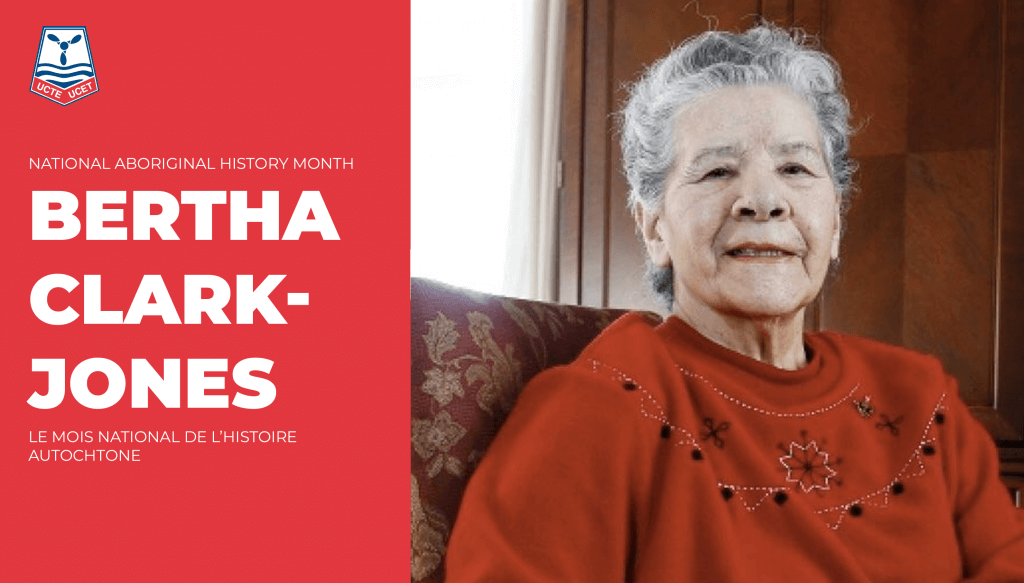National Aboriginal History Month The Story Behind Bertha Clark-Jones
In honour of National Aboriginal History Month, UCTE has decided to tell the story of Bertha Clark-Jones. This activist of Cree- (Nehiyawak) Métis descent, born November 6, 1922 in Clear Hills, Alberta, was the fifth child in a family of fourteen, all of Cree-Métis descent, and one of the first to settle in the small community of Clear Hills. Bertha lived in poverty, working on a farm to earn her living.
From an early age, Bertha Clark-Jones was known in her community for stepping in when someone faced injustice. She says that growing up in a large family led her to feel a great deal of compassion and concern for the people around her. Her parents gave her values of self-determination and a strong work ethic, contributing to her career as a fierce activist later in life.
Just before World War II, in 1939, she moved to Grande Prairie, Alberta where she lived with her sister and brother-in-law. She worked in the area, contributing to the war effort. In 1940, aged 18, she enlisted in the Royal Canadian Air Force. Bertha travelled all over the country during the war, but never took part in an overseas mission. In the aftermath of the war, she used her military experience to advocate for fair treatment of Aboriginal veterans, and later joined the Aboriginal Veterans Society (Aboriginal Peoples and the World Wars).
“I never perceived any discrimination in the Royal Canadian Air Force. The fact that I was young, Aboriginal, or a woman, didn’t figure […] we had no time for discriminatory practices.”
A Canadian Act (Veterans Land Act) encouraged former members of the Armed Forces by providing them with loans to cultivate land. However, as a woman, Bertha was not allowed to own land in the Métis settlement, a discriminatory rule that revolted her. In addition to this difficulty, she noted that “First Nations people lost their status after leaving their reserves to enlist, and for that reason had no land or homes when they returned.” The Indian Act at the time stated that First Nations soldiers who were away from their reserves for more than four years would lose their Indian status.
All of these events led Bertha Clark-Jones to become a fighter for human rights and the rights of Aboriginal women. During the war, Bertha fell in love with an Australian who was in Canada temporarily. She became pregnant, but as her sergeant had to return to his homeland, she decided to give the child up for adoption. She had no resources to raise it. Eventually, she met a veteran she knew previously and decided to marry. Together they built a family of six children.
When the family farm burned to the ground, Bertha moved to Fort McMurray. There, she helped establish Nistawoyou, an Aboriginal Friendship Centre, which became a meeting place for Aboriginal men and women arriving from northern Canada in search of work. She also served on the centre’s housing committee and, later, on NewStart, an educational development program.
With her extensive experience, in 1968 she co-founded the Voice of Alberta Native Women’s Society, a foundation representing Aboriginal women with and without Indian status, to help them gain equal rights under the Indian Act. In addition to all these accomplishments, she decided to help the society fight for the rights of Aboriginal foster children in the early 1970s.
Determined to continue her fight, Bertha Clark-Jones was part of the team when the Society became the Native Women’s Association of Canada. She became its first president in 1974. She continued to fight to overcome many of the barriers faced by Aboriginal children in Canada’s social services system.
In 1980, in retirement, she continued to defend and promote Aboriginal laws, spiritual beliefs, languages and traditions. She served on the steering committee of the Institute for the Advancement of Aboriginal Women in the production of the book, Our Women in Uniform: Honouring Aboriginal Women Veterans of Alberta, published in 2003. She was also recognized as an elder in the Métis community in Alberta.
All in all, Bertha was a fighter. Born a social activist, she dedicated her life to helping Aboriginal people in Canada. She continued until her death on October 21, 2014 in Bonnyville, Alberta to encourage her son to pursue petitions to the Lieutenant Governor of Alberta calling for referendums on carbon pricing and the controversial Bill 6, which would lead to new workplace safety and compensation rules for farm and ranch workers. George says that three days before his mother died of a heart attack aged 91, Bertha Clark-Jones told him, “They need to hear what you have to say.” Despite strong opposition, in December of 2015, Bill 6 passed.
Picture: https://edmontonjournal.com/news/insight/life-times-m%C3%A9tis-activist-galvanized-by-early-injustice
